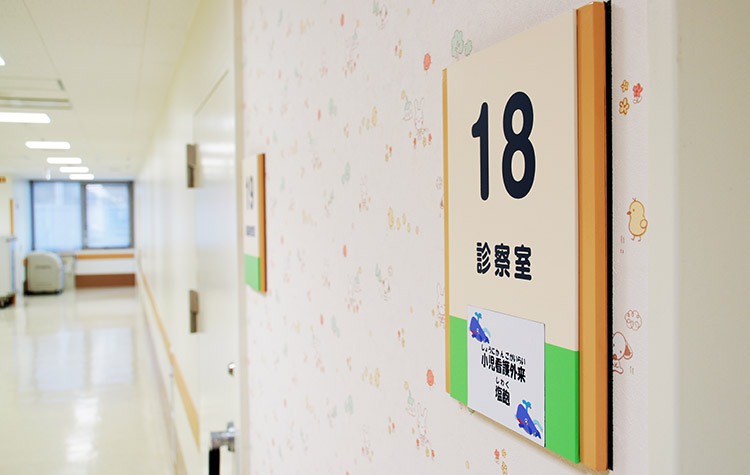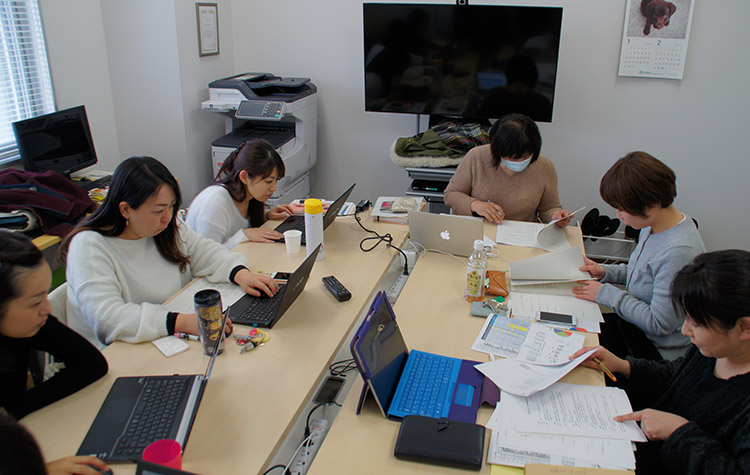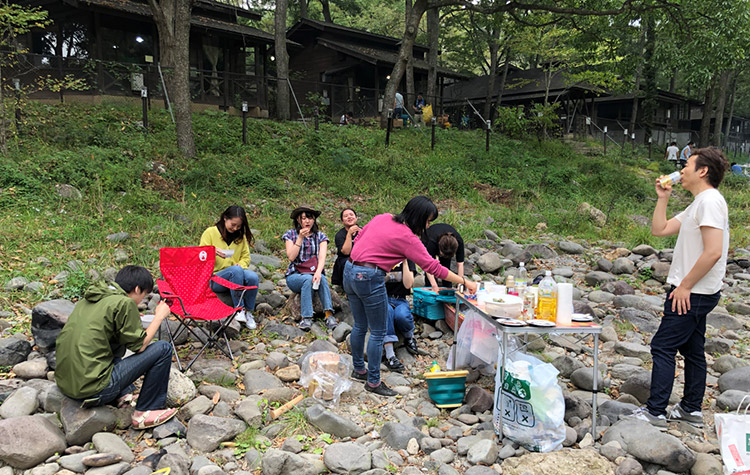大学院説明会
特設ウェブサイト
- トップ
- インタビュー
- 塩飽 仁
現場でケアを主導するリーダーを育成
子どもや家族を心理・社会的に支える
看護を社会に発信
Nurturing leaders who lead care in the field
Supporting Children and Families Psychologically and Socially
Disseminating Nursing to Society
- 保健学専攻
- Health Sciences
- 小児看護学分野 教授
- Department of Child Health Nursing Professor
- 塩飽 仁
- Hitoshi Shiwaku
- 2020.06.04
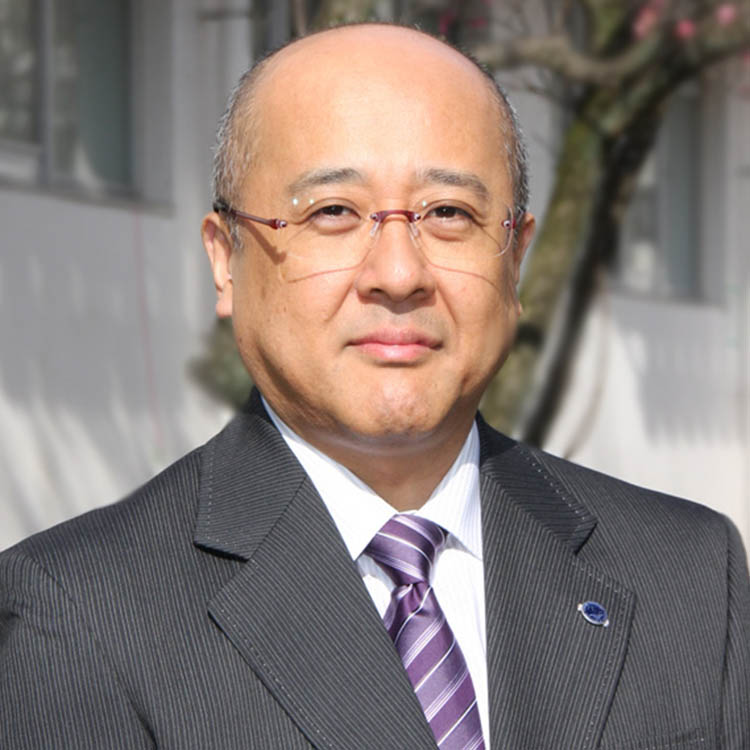
子供と家族を支える看護の探求
The Search for Nursing to Support Children and Families
●研究の概要を教えてください
小児看護学分野は、子供と家族を発達上のライフイベントに応じて支援する看護を探究している分野です。特に子供と家族を心理・社会的に支える看護の研究、教育、実践に力を入れています。東北大学病院をはじめ、地域の学校、医療機関、他大学などとも連携しながら活動しています。
我々の分野の研究と実践のおもなテーマは以下の通りです。
1.子供と家族を心理・社会的に支える看護支援の開発
2.神経症や発達障害の子どもの療育支援と家族へのメンタルヘルスケア
3.小児がんの子供と家族のトータルケア
大学院博士課程前期(修士)では、小児看護の高度看護専門職者である小児看護専門看護師(CNS(Certified Nurse Specialist) in Child Health Nursing)の育成を行っています。CNSは複雑な健康問題をかかえる対象にケアとキュアを統合して卓越したケアを提供し、相談、調整、倫理調整、教育、研究を行って、ケアシステム全体の看護の質を向上させる看護師です。大学院修士課程修了後に日本看護協会が行う資格試験に合格することが必要で、小児看護CNSは日本に256名しかおりません。本学の教育課程は2014年1月に国立大学では初めて日本看護系大学協議会の小児看護CNS教育課程(38単位)として認定されました。
●What is your research summary?
The Field of Pediatric Nursing is an area in which we are exploring nursing to support children and families in response to developmental life events. In particular, we focus on the research, education, and practice of nursing that supports children and families psychologically and socially. We work in cooperation with Tohoku University Hospital, local schools, medical institutions, and other universities.
The main themes of research and practice in our field are as follows:
1. Development of nursing support to support children and their families psychologically and socially
2. Support for the care of children with neurosis and developmental disorders and mental health care for their families
3. Total Care for Children and Families with Childhood Cancer
In the first semester of the master’s program, we are training (CNS (Certified Nurse Specialist) in Child Health Nursing, a highly specialized nursing professional in pediatric nursing. CNS is a nurse who integrates care and cure and provide outstanding care for those who have complex health problems, and improves the quality of nursing throughout the care system through consultation, coordination, ethical coordination, education, and research. After completing the master’s degree, it is necessary to pass the qualification examination conducted by the Japan Nursing Association, and there are only 256 pediatric nursing CNS in Japan. In January 2014, the university’s curriculum was recognized as a pediatric nursing CNS curriculum (38 credits) by the Japan College of Nursing Colleges for the first time.
●研究室はどのような雰囲気ですか?
毎週金曜日の夕方から大学院生と教員でセミナーを行っています。大学院生には青森や山形、東京の大学で教員をしている方がおりますので、いつも各地を結んだオンラインミーティングです。月初めは院生と教員がざっくばらんに研究以外の日頃の活動を紹介したり、情報の共有を行ったりします。時には家族や趣味の話に花が咲くこともあります。
セミナーは、子供と家族の看護・医療に関する最新の文献を持ち寄って抄読を行い、世界の研究動向を把握したり、新しい研究方法を学んだり、研究成果についてディスカッションしながら院生と教員が自由にそして深く考え意見を交える時間にしています。
また、セミナーで院生は自分の研究進捗状況を報告しつつ、自分の研究計画の組み立てやデータの分析、結果に対する考察に関して参加者全員からさまざまなクリティーク、アドバイスを受けます。分野では前向きで開かれた雰囲気を大切にしています。
学会などの出張で各地のお土産が集まることもしばしばです。卒業研究ゼミの学生も加わって春には花見、秋には仙台名物の芋煮会も行っています。
●What’s the atmosphere like in your lab?
Seminars are held every Friday evening with graduate students and faculty members. There are graduate students who are University Faculty in Aomori, Yamagata, and Tokyo, so it is always an online meeting that connects the various places. At the beginning of the month, graduate students and faculty members introduce daily activities other than research and share information. Sometimes we talk the story of our own family and the hobby. At the seminar, we brings together the latest literature on nursing and medical care for children and families, and read, understand global research trends, learn new research methods, and discuss research results , which allowing graduate students and faculty members to freely and deeply think and exchange opinions.
In addition, at the seminar, graduate students report on their research progress and receive various critique and advice from all participants on the assembly of their research plans, analysis of data, and consideration of the results. In this field, we value a positive and open atmosphere.
Souvenirs from various places are often seen after business trips such as academic conferences. With the addition of students from the graduation research seminar, we also have cherry blossom viewing in spring and Sendai’s famous Imoni-kai in autumn.
自らの手で獲得を
Acquire with your own hands
●学生にどのようなことを期待しているかなども含め、進学希望者へのメッセージをお願いします
子供と家族を支えるケアとは何か、その要素と方法を創出するためには、自ら調べ確かめ考えることが不可欠です。ご理解いただいていると思いますが、大学院は知識やスキルを授けてもらう場ではありません。自らの手で獲得する場です。大学院で学ぶということは、そのような挑戦が許される機会が得られるということであり、そのような時間が保証されるということであり、その環境が提供されるということです。
自分が研究を行うことで、分からなかったことの一端が分かるようになり、今までできなかったことが少しだけできるようになる、それがいつか誰かの役に立つということ、その役割を担うことを強く意識して学んで欲しいと願っています。
●Please give a message to prospective students, including what you expect from the students.
In order to create the elements and methods of care that supports children and families, it is essential to examine and consider by yourselves. As you may understand, graduate school is not a place to receive knowledge and skills. It is a place to acquire with your own hands. Studying in graduate school means that you have the opportunity to take on such challenges, that such time is guaranteed, and that environment is provided. By doing your research, you will be able to understand some of the things you didn’t understand and do a little bit of things that you couldn’t do before, and that it will be useful to someone someday. I want you to learn with a strong awareness that you will play that role.
●修了後はどのような進路がありますか?また、修了生はどのように活躍していますか?
小児看護学分野は2009年に初めて大学院修了生を送り出しました。現在まで博士課程前期(修士)を修了した方は16名で、そのうち11名が小児看護CNSの資格を取得し、現在も全員が臨床現場の第一線でその力を発揮して高度看護専門職者として活躍しています。修了生のほとんどが小児専門病院や大学病院に所属しており、なかには児童精神科病棟の看護師として、高校の養護教諭として勤務している方もいらっしゃいます。
それぞれの現場でケアを主導するリーダーとして大学院時代に修得した高度な看護実践能力を活かして子供や家族をケアしつつ、リサーチマインドに基づいて研究にも取り組み続け、その成果を学会や臨床の場で発信しています。
博士課程後期(博士)の修了生は3名で、2名は大学の准教授、助教として教育や研究の最先端で時代を牽引する役割を担っています。もう1名は小児専門病院でCNSとして勤務しながら、研究や論文執筆を続けています。3名ともナショナルセンターの研究メンバーとして、他大学との共同研究メンバーとして常に研究に取り組んでおり、教科書の執筆や教育ツールの開発、後進の指導でも大活躍中です。
●What career paths are available to the students after they graduate? What are the graduates doing well there?
In the field of pediatric nursing, first graduate students graduated in 2009. To the present, 16 students have completed their master’s degree, 11 of whom have obtained pediatric nursing CNS certifications, and all of them are still active as advanced nursing professionals by exerting their abilities at the fore in clinical practice. Most of the graduates belong to children’s specialized hospitals and university hospitals, and some of them work as nurses in the child psychiatry ward and as nursing teachers in high schools.
Taking advantage of the advanced nursing practice skills acquired in graduate school as a leader in care at each site, they continue to work on research based on our research mind and disseminate the results at academic conferences and clinical sites. There are three doctoral students who have completed their doctoral programs, and two of them are associate professors and assistant professors at universities, and play a leading role at the cutting edge of education and research. The other is working as a CNS at a children’s hospital and continuing to research and write papers. All three of them are research members of the National Center and are constantly working on research as joint research members with other universities, and are also active in writing textbooks, developing educational tools, and teaching future students.
●病院や企業に勤務しながらの修学は可能でしょうか?
はい、可能です。これまで私たちの分野を修了された19名のうち、勤務しながら学位所取得された方は15名で、およそ8割の方が仕事を持ちながら研究と臨床トレーニングをこなされました。また、子育てをしながらという方もいらっしゃいました。
職場と家族の理解と支援が必要ではありますが、学び探究したいというリサーチマインドがあれば十分に可能だと思います。このような経験をもつ分野の先輩達に相談すれば有効なアドバイスも得られると思います。
Is it possible to study while working at a hospital or in a company?
Yes, it is possible. Of the 19 people who have completed our field so far, 15 have obtained a degree while working, and about 80% have worked with research and clinical training. There were also people who were raising children.
It is necessary to understand and support the workplace and the family, but I think it is possible enough if there is a research mind that wants to learn and explore. If you talk to seniors who experienced that situation, you will get effective advice.
「Global Standard」を皆で作り上げる
We’re all going to create a Global Standard.
●東北大学の良いところは?
東北大学の最大の特徴は自由であるところだと思います。自由でありつつ、院生も教員も目指すところは「Global Standard」であることです。決して同じところに留まらない。自由であるが故に自律的かつ公益的でなければならず、それを大学の構成員が個々にしっかり理解して実践しているところだと思います。
保健学専攻看護学コースでは、博士課程前期でがん看護CNSと保健師も養成しています。研究の基礎を学ぶ科目や、専門性が高いけれども分野横断的な科目では、さまざまな分野のさまざまな背景を持った大学院生が集まって、講義を聴き、自ら調べまとめた内容をプレゼンテーションし、論文を読んでその内容について意見を交わし、日々切磋琢磨しています。博士課程後期でも同様であり、さらに他の研究機関とのコラボレーションも日常的です。
このようにして学べる環境を皆で作り上げているところが東北大学の特徴だと思っています。
●What are the advantages of Tohoku University?
I think the biggest feature of Tohoku University is that it is free. While being free, both graduate students and teachers aim to be a Global Standard. Never stay in the same place. I think that it is necessary to be autonomous and public interest because it is free, and the member of the university understands it well individually and puts it into practice.
In the Nursing Course of the Department of Public Health, we also train cancer nursing CNS and public health nurses at the first semester of the doctoral program. In courses that study the basics of research and courses that are highly specialized but cross-sectoral courses, graduate students from various fields or backgrounds gather to listen to lectures, give presentations on their own research, read papers, exchange opinions on the content, and work hard every day. The same is at the doctoral program, and collaboration with other research institutions is also daily.
I think the characteristic of Tohoku University is that we are all created an environment where we can learn in this way.
趣味はロードバイクです。晴れた週末は60㎞くらい走ります。休暇が取れた時は自転車を持って旅に出掛けます。これまで沖縄本島、石垣島、宮古島、琵琶湖、霞ヶ浦、サロマ湖、浜名湖、猪苗代湖、根室半島、知多半島など、どこかの一周シリーズを続けてきました。北海道や山形、沖縄のファンライドイベントにも参加しました。
このコースは難しいかなと思っても、走りきらないと帰れないので、諦めずにチャレンジする、完走するための攻略法を考えるなど、身体を鍛えるつもりで始めた自転車ですが、むしろ心と頭が鍛えられます。
現在の1日の最長走行可能距離は130㎞ですが、もう少し鍛えて今後は淡路島や宍道湖あたりを一周したいと思っています。
自然のなかを自分の肉体と自転車だけで駆け抜ける爽快感と、季節とともに移り変わってゆく風景を味わえることが醍醐味です。
My hobby is road bikes. I run about 60km on a sunny weekend. When I can take a vacation, I go on a trip with my bicycle. Up to now, I have been going around various islands and lakes., such as Okinawa main island, Ishigaki Island, Miyako Island, Lake Biwa, Kasumigaura, Lake Saroma, Lake Hamana, Lake Inawashiro, Nemuro Peninsula, Chita Peninsula, etc. I also participated in fan ride events in Hokkaido, Yamagata, and Okinawa.
Even if I think that this course is difficult, I can't go home unless I run. So I started with the intention of training my body, but I can train my mind and head because I try without giving up and think about how to complete the race while any race.
The maximum travel distance per day is 130km, but I want to train a little more and go around Awaji Island and Lake Shinji in the future.
It is a real pleasure to be able to experience the exhilarating feeling of running through nature only with my body and bicycle, and the scenery that changes with the season.
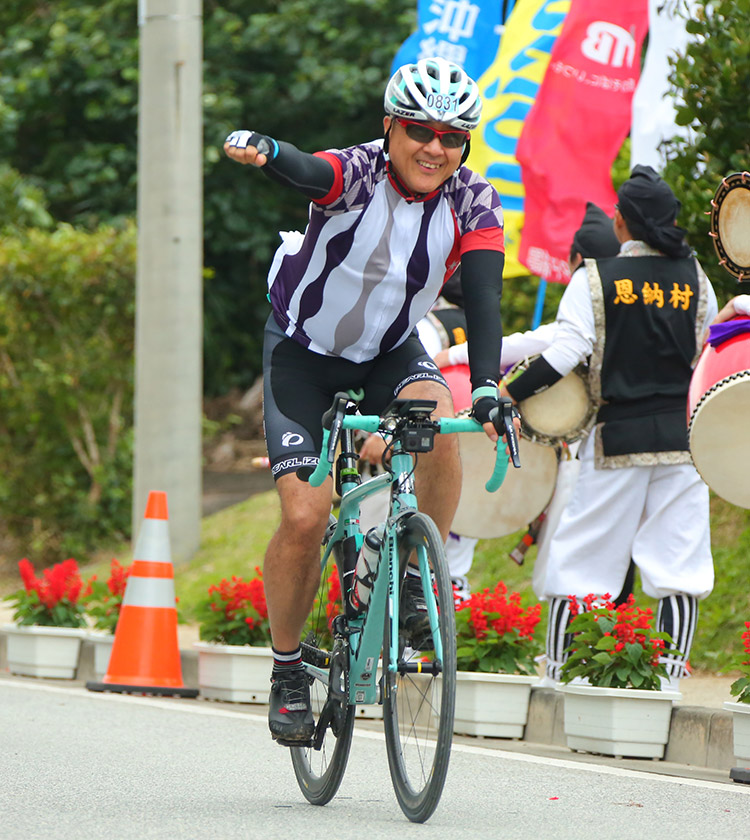
- PROFILE
- 保健学専攻
- Health Sciences
- 小児看護学分野 教授
- Department of Child Health Nursing Professor
- 塩飽 仁
- Hitoshi Shiwaku
弘前生まれ、仙台育ち。
千葉大学看護学部卒業。千葉大学大学院看護学研究科に進学、看護学修士を取得後、山形大学で医学博士を取得。日本初の男性保健師。
東北大学病院手術部、小児科病棟で看護師として勤務。
大学教員としては、東北大学、山形大学を経て2004年東北大学医学部保健学科開設時に着任。
1992年から東北大学病院小児科外来の「小児看護外来」で子供と家族のケアを行う。
Born in Hirosaki and raised in Sendai.
Graduated from the Faculty of Nursing, Chiba University. After entering the Graduate School of Nursing, Chiba University, and obtaining a master's degree in nursing, he obtained a doctorate in medicine from Yamagata University. Japan's first male public health nurse.
Worked as a nurse in the pediatric ward and the Department of Surgery, Tohoku University Hospital.
After working as a university teacher at Tohoku University and Yamagata University, he was appointed the Department of Health Sciences at Tohoku University School of Medicine in 2004.
Since 1992, he has been caring for children and their families at the Pediatric Nursing Outpatient Clinic at Tohoku University Hospital.
hsiwaku*med.tohoku.ac.jp (「*」を「@」に変換してください。)
